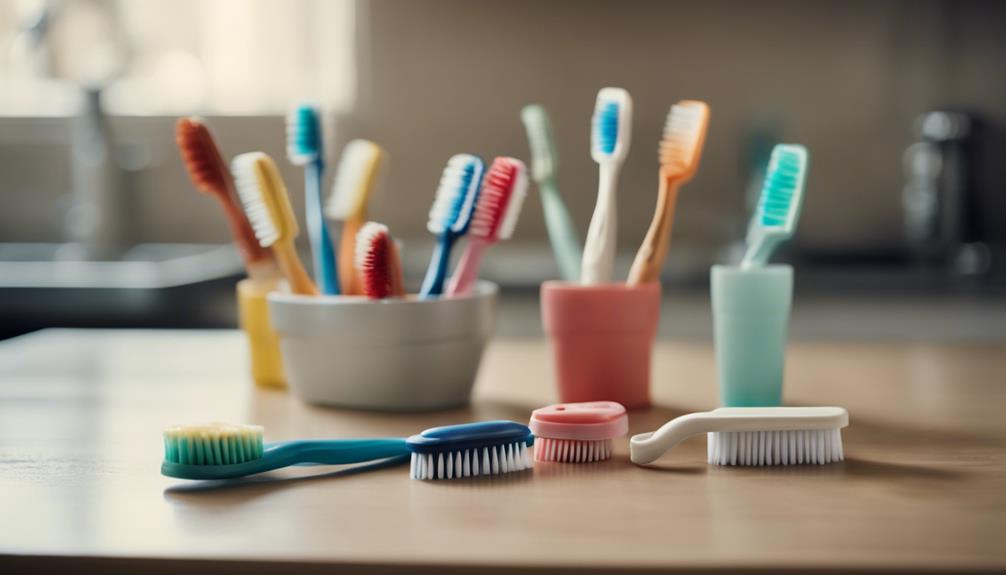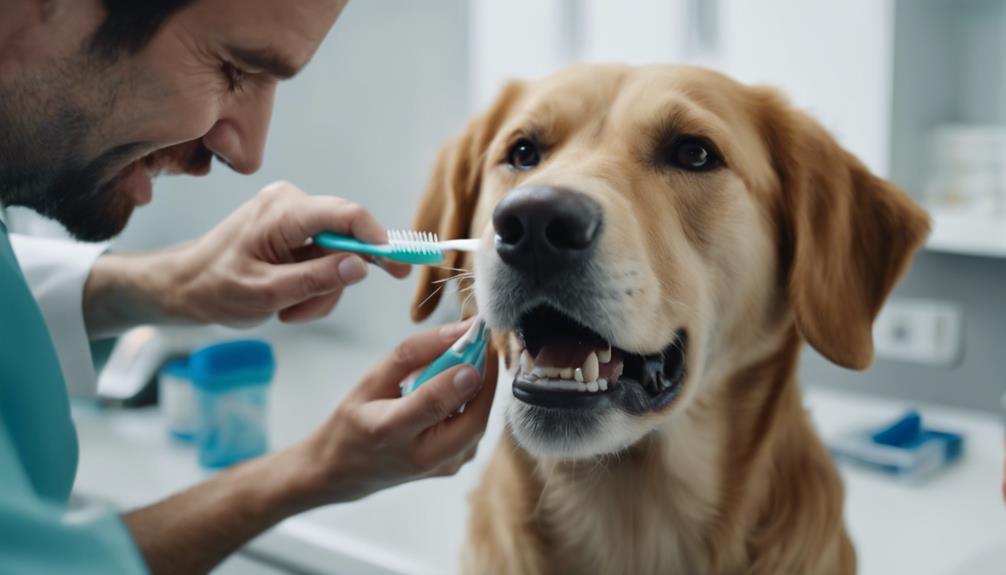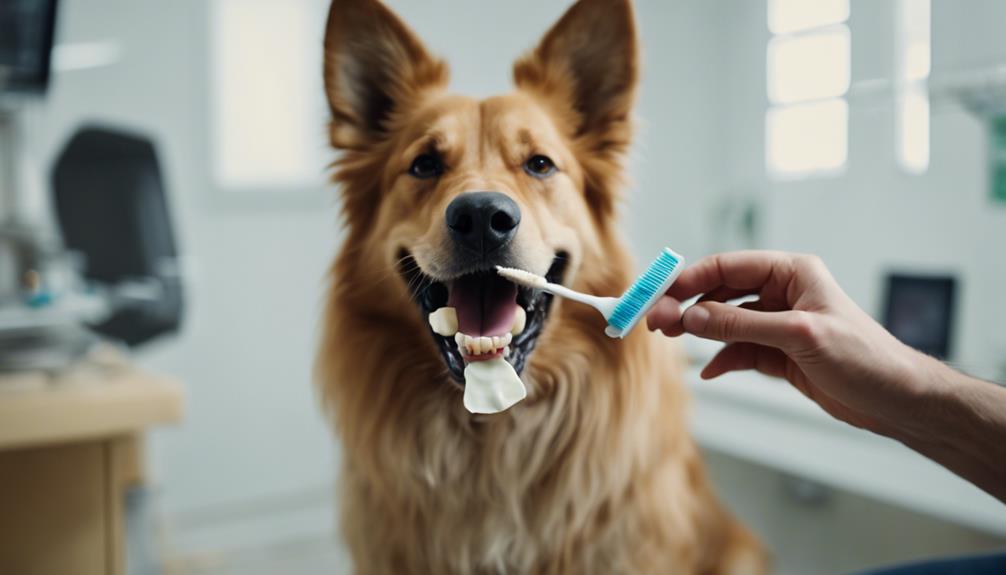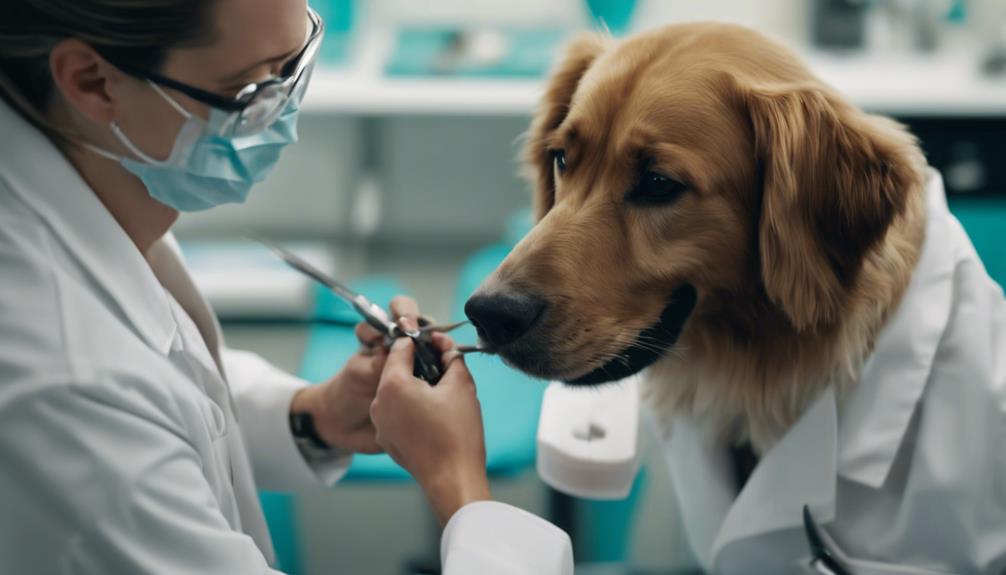In the realm of pet care, maintaining your dog's dental hygiene is a crucial aspect often overlooked by many pet owners. With vet-approved methods for brushing your dog's teeth being the cornerstone of preventive oral care, it's essential to understand the significance of this practice.
By implementing gradual introduction techniques and incorporating positive reinforcement, pet owners can pave the way for a successful dental care routine. The selection of appropriate tools and the establishment of a brushing regimen can significantly impact your dog's oral health.
Stay tuned to discover the key strategies and practices vet professionals recommend for optimal canine dental care.
Key Takeaways
- Start early to establish good oral hygiene habits for lifelong care.
- Use positive reinforcement and treats to make brushing a rewarding experience.
- Choose pet-specific toothpaste and gentle tools for effective cleaning.
- Consistency in a regular brushing routine is crucial for your dog's dental health.
Introduction to Dog Teeth Brushing
Introducing your dog to the practice of teeth brushing plays a fundamental role in establishing a lifelong oral care routine that promotes their overall dental health. By starting this habit early, ideally when the dog is a puppy, you set the foundation for good oral hygiene.
Begin by gradually introducing the toothbrush and allowing the dog to lick toothpaste off the brush to familiarize them with the process. Start by brushing the front teeth and gradually work your way to the entire mouth. This gradual approach helps the dog become comfortable with teeth brushing and sets the stage for a positive brushing experience in the future.
Ensuring Positive Reinforcement
To establish a successful teeth brushing routine for your dog, ensuring positive reinforcement techniques is crucial in creating a favorable and rewarding experience for them. Positive reinforcement not only makes the process more enjoyable for your dog but also helps in building a strong bond between you and your pet.
Here are three effective ways to incorporate positive reinforcement into your dog's teeth brushing routine:
- Use treats: Reward your dog with a small treat after each successful brushing session.
- Praise and affection: Shower your dog with praise and affection throughout the brushing process to make them feel loved and appreciated.
- Interactive play: Incorporate interactive play sessions before or after brushing to associate the activity with fun and excitement.
Choosing the Right Tools

When considering the appropriate tools for brushing your dog's teeth, it is essential to prioritize pet-specific toothpaste and Veterinary Oral Health Council-approved products. Pet-specific toothpaste is formulated to be safe for dogs, as it does not contain ingredients that could be harmful if ingested.
Additionally, products approved by the Veterinary Oral Health Council ensure they meet specific standards for effectiveness in maintaining oral health. Opting for finger brushes over regular toothbrushes can also make the process easier, especially when starting with a puppy or a dog new to teeth brushing.
Remember to avoid using human toothpaste on dogs, as it can be toxic when swallowed. Focus on using gentle circular or up-and-down motions to effectively clean your dog's teeth.
Establishing a Brushing Routine
To maintain optimal oral health for your dog, establishing a consistent brushing routine is paramount. Here are three key steps to help you create a successful brushing routine for your furry friend:
- Set a Regular Schedule: Choose a time of day that works best for both you and your dog, whether it's after a meal or before bedtime. Consistency is key to forming a habit.
- Start Slowly: Introduce the toothbrush and toothpaste gradually to allow your dog to get comfortable with the process. Begin with short brushing sessions and gradually increase the duration as your dog becomes more accustomed to it.
- Use Positive Reinforcement: Reward your dog with treats, praise, or playtime after each brushing session to make the experience enjoyable and reinforce good behavior. Positive associations will help make brushing a positive experience for your dog.
The Significance of Dental Care

Ensuring proper dental care for your dog is essential for maintaining their overall health and well-being. Dental care plays a crucial role in preventing dental diseases that can affect not only your dog's teeth and gums but also their overall health.
It is estimated that approximately 80% of dogs exhibit signs of dental disease by the age of 3, highlighting the significance of regular oral hygiene practices. Failure to address dental issues can lead to more severe health problems, including organ damage and infections.
Additional Dental Care Practices
Proper maintenance of your dog's oral hygiene extends beyond regular brushing and professional cleanings to encompass a range of additional dental care practices. To ensure your furry friend's dental health is at its best, consider the following practices:
- Dental Chews: Provide dental chews that are designed to promote oral health by reducing plaque and tartar buildup.
- Water Additives: Consider using water additives that can help to reduce bacteria in your dog's mouth and freshen their breath.
- Routine Inspections: Regularly inspect your dog's mouth for any signs of dental issues such as swollen gums, loose teeth, or unusual growths. If you notice any problems, consult your veterinarian promptly for further evaluation and treatment.
Incorporating Dental Treats

When considering additional practices to maintain your dog's dental health, one effective approach is to incorporate dental treats into their oral care routine. Dental treats can help reduce plaque and tartar buildup, freshen breath, and provide mental stimulation for your dog. It's essential to choose dental treats that are specifically designed to promote oral health and are approved by veterinary professionals. Look for treats that have a texture or ingredients that help scrub your dog's teeth as they chew. Remember to monitor your dog while they enjoy their dental treats to ensure they are safe and appropriate for their size and chewing habits.
| Pros | Cons |
|---|---|
| Helps reduce plaque | Some treats may be high in calories |
| Freshens breath | Potential for digestive issues |
| Provides mental stimulation | Not a substitute for regular brushing |
Supporting Oral Health With Diet
To promote optimal oral health in dogs, dietary choices play a significant role in supporting their overall dental well-being. When considering your dog's diet to support their oral health, keep the following in mind:
- Choose Dental Health-Focused Foods:
Opt for specially formulated dog foods that are designed to promote dental health. Look for options that are approved by veterinary dental associations and contain ingredients that support oral hygiene.
- Incorporate Dental Chews or Treats:
Offer dental chews or treats that are specifically designed to reduce plaque and tartar buildup. These treats can help keep your dog's teeth clean and their gums healthy between brushings.
- Provide Raw Bones for Chewing:
Raw meaty bones can help naturally clean your dog's teeth and provide mental stimulation. Ensure the bones are appropriate for your dog's size and supervised to prevent any choking hazards.
Professional Cleanings and Vet Consultation

Have you scheduled your dog's next professional dental cleaning and veterinary consultation? Regular professional cleanings are essential to maintain your dog's oral health. During these appointments, the veterinarian will not only clean your dog's teeth but also conduct a thorough examination of the mouth, gums, and teeth to identify any potential issues early on. Additionally, they can provide guidance on at-home dental care and recommend specific products tailored to your dog's needs. Consultation with a vet is crucial to address any concerns you may have about your dog's dental health and to ensure they receive the best possible care.
| Benefits of Professional Cleanings | |
|---|---|
| Early detection of dental issues | Guidance on at-home dental care |
| Tailored recommendations for products | Addressing concerns and queries |
Conclusion
In conclusion, implementing vet-approved methods for brushing your dog's teeth is crucial for maintaining their overall health and well-being. By establishing a routine, selecting the right tools, and understanding the significance of dental care, pet owners can contribute to their canine companion's longevity and quality of life.
Additional practices such as dental treats, a balanced diet, and regular professional cleanings further support optimal oral health. Consultation with a vet is recommended for tailored advice on your dog's dental care needs.




